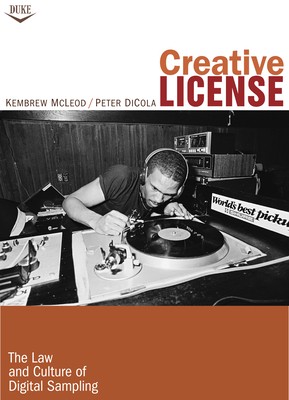
- We will send in 10–14 business days.
- Author: Kembrew McLeod
- Publisher: Duke University Press
- ISBN-10: 0822348756
- ISBN-13: 9780822348757
- Format: 15.5 x 21.3 x 2.3 cm, minkšti viršeliai
- Language: English
- SAVE -10% with code: EXTRA
Reviews
Description
How did the Depression-era folk-song collector Alan Lomax end up with a songwriting credit on Jay-Z's song "Takeover"? Why doesn't Clyde Stubblefield, the primary drummer on James Brown recordings from the late 1960s such as "Funky Drummer" and "Cold Sweat," get paid for other musicians' frequent use of the beats he performed on those songs? The music industry's approach to digital sampling-the act of incorporating snippets of existing recordings into new ones-holds the answers. Exploring the complexities and contradictions in how samples are licensed, Kembrew McLeod and Peter DiCola interviewed more than 100 musicians, managers, lawyers, industry professionals, journalists, and scholars. Based on those interviews, Creative License puts digital sampling into historical, cultural, and legal context. It describes hip-hop during its sample-heavy golden age in the 1980s and early 1990s, the lawsuits that shaped U.S. copyright law on sampling, and the labyrinthine licensing process that musicians must now navigate. The authors argue that the current system for licensing samples is inefficient and limits creativity. For instance, by estimating the present-day licensing fees for the Beastie Boys' Paul's Boutique (1989) and Public Enemy's Fear of a Black Planet (1990), two albums from hip-hop's golden age, the authors show that neither album could be released commercially today. Observing that the same dynamics that create problems for remixers now reverberate throughout all culture industries, the authors conclude by examining ideas for reform.
Interviewees include David Byrne, Cee Lo Green, George Clinton, De La Soul, DJ Premier, DJ Qbert, Eclectic Method, El-P, Girl Talk, Matmos, Mix Master Mike, Negativland, Public Enemy, RZA, Clyde Stubblefield, T.S. Monk.
EXTRA 10 % discount with code: EXTRA
The promotion ends in 21d.22:29:48
The discount code is valid when purchasing from 10 €. Discounts do not stack.
- Author: Kembrew McLeod
- Publisher: Duke University Press
- ISBN-10: 0822348756
- ISBN-13: 9780822348757
- Format: 15.5 x 21.3 x 2.3 cm, minkšti viršeliai
- Language: English English
How did the Depression-era folk-song collector Alan Lomax end up with a songwriting credit on Jay-Z's song "Takeover"? Why doesn't Clyde Stubblefield, the primary drummer on James Brown recordings from the late 1960s such as "Funky Drummer" and "Cold Sweat," get paid for other musicians' frequent use of the beats he performed on those songs? The music industry's approach to digital sampling-the act of incorporating snippets of existing recordings into new ones-holds the answers. Exploring the complexities and contradictions in how samples are licensed, Kembrew McLeod and Peter DiCola interviewed more than 100 musicians, managers, lawyers, industry professionals, journalists, and scholars. Based on those interviews, Creative License puts digital sampling into historical, cultural, and legal context. It describes hip-hop during its sample-heavy golden age in the 1980s and early 1990s, the lawsuits that shaped U.S. copyright law on sampling, and the labyrinthine licensing process that musicians must now navigate. The authors argue that the current system for licensing samples is inefficient and limits creativity. For instance, by estimating the present-day licensing fees for the Beastie Boys' Paul's Boutique (1989) and Public Enemy's Fear of a Black Planet (1990), two albums from hip-hop's golden age, the authors show that neither album could be released commercially today. Observing that the same dynamics that create problems for remixers now reverberate throughout all culture industries, the authors conclude by examining ideas for reform.
Interviewees include David Byrne, Cee Lo Green, George Clinton, De La Soul, DJ Premier, DJ Qbert, Eclectic Method, El-P, Girl Talk, Matmos, Mix Master Mike, Negativland, Public Enemy, RZA, Clyde Stubblefield, T.S. Monk.


Reviews